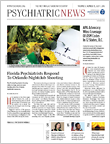Mr. M is a 38-year-old, homeless man with a history of schizophrenia and cannabis use disorder brought to the emergency department (ED) by emergency medical services from a local homeless shelter. Staff report, “He just went wild. He started saying he was God, that people were poisoning him, and then tried to punch a security guard.” Urine toxicology is negative for all substances. Initially he required medication for agitation, but over 48 hours, he gradually returned to baseline and was discharged. He has no memory of what happened but admits to smoking K2 daily.
This was an all-too-common clinical presentation during my psychiatric ED rotation in summer 2015. Individuals, predominantly homeless and with a history of mental illness, were presenting acutely psychotic; only to improve within 24 to 48 hours. A substance-induced disorder was on my differential diagnosis, but Mr. M’s urine toxicology was negative. This was how I first learned about synthetic cannabinoids, known colloquially by names like K2, Spice, and Scooby Snax.
From other residents in the New York City area, I learned of similar presentations in their EDs. As a budding addiction psychiatrist, I wanted to know more about this emerging class of drugs that was taking the city by storm. Unfortunately, research data on K2 are sparse and come largely from case reports. With funding from the American Academy of Addiction Psychiatry and APA’s New York County District Branch, I brought together addiction psychiatry and health policy experts in March to discuss K2 in New York City.
Synthetic cannabinoids are full agonists of the CB1 receptor, which is heavily expressed in the central nervous system. In contrast, the THC in marijuana is a partial CB1 agonist. Therefore, synthetic cannabinoids like K2 can result in much more dramatic clinical presentations including psychiatric symptoms (agitation, anxiety, paranoia, hallucinations), sympathetic reactions (tachycardia/hypertension), and acute kidney injury. People with mental illness are more likely to develop severe symptoms.
Adam Demner, M.D., an addiction psychiatrist and a clinical assistant professor at New York University, summarized the central challenge posed by these drugs: “Basically things are legal until they’re illegal.” From 2012 to 2015, the Drug Enforcement Agency exercised its emergency scheduling authority and classified 26 compounds as Schedule I under the Synthetic Drugs Abuse Prevention Act of 2012. However, the sheer number and diversity of compounds made enforcement difficult. According to Dr. Demner, “It kind of created this game of Catch Me If You Can.”
Meanwhile, cities like New York were struggling under the ever-increasing public health burden posed by K2. In the first half of 2015, there were 4,500 K2-involved emergency department visits in New York City alone, with more than 2,300 occurring in July and August. This was the situation confronting Hillary Kunins, M.D., M.P.H., assistant commissioner of the New York City Bureau of Alcohol and Drug Use Prevention, Care, and Treatment: “When I started this journey, it was not anything we at the health department had seen before … this liminal quasi-legal situation.” K2 was sold openly in bodegas and corner-stores across the city. Mr. M bought K2 just a few blocks from the hospital.
Using epidemiologic data from hospital EDs, New York City officials identified ZIP codes with the highest K2 burden. Using a patchwork of regulatory and legal powers, city officials conducted searches in “high K2” neighborhoods on businesses known to sell both quasi-legal K2 and illegal untaxed tobacco. This gave officials the latitude to confiscated large amounts of K2. The result was a 40 percent reduction in K2-related ED visits in these neighborhoods, heightened public awareness, and the passage of legislation in late 2015 by the New York City Council to criminalize K2. Dr. Kunins emphasized that addressing emerging drugs of abuse requires agencies to be “nimble … there is no one right-sized solution.”
The New York City experience highlights how data collected by ED physicians can be used to dramatically improve the health of communities. While lawmakers ultimately criminalized K2 use, this is unlikely to fully address the numerous sociopolitical and neurobiological reasons that people initiate and continue to use drugs like K2. Instead, we as psychiatrists need to learn about synthetic cannabinoids, develop evidence-based treatment strategies, and continue to advocate for public policy based on sound research. ■

